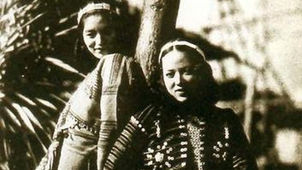articles.

about.
Synchronizing Asian Contemporary Moving Image Art (SACMIA) is initiated in 2019 based on an encounter of Chen Pei Yu (Doris), Angga Cipta (Acip) and Raslene in 2017. They converse about cinema and art, then found out that Taiwan cinema is not only hard to find on the screen of Indonesia but also there are some similarities on topics and issues that being raised by the Indonesian and Taiwan directors. An interesting start point to begin the project.
At first, they had a plan to make the screening of Taiwan and Indonesia movies and have a discussion afterward with the public, but by limited time and resources, they decided to dig and figure out more about Indonesia and Taiwan cinema history first. The objective is not to juxtapose both countries to be twining in cinema history, but to find things that missed out from the big frame and art discourse. The main object to investigate is not just cinema, but they are also focusing on any other kind of moving images, as a form of art that speaks about contemporary and progressivity.
共時的亞洲當代活動影像藝術(SACMIA)始於2019年,基於2017年陳沛妤(Doris)、Angga Cipta(Acip)和Raslene的相遇。他們談論電影和藝術,發現到台灣電影不僅難以在印尼上映,卻有一些相似的主題與議題同時被台灣與印尼導演提出。這成為這項計畫的一個有趣的開端。
最初,他們計畫舉辦台灣與印尼電影的放映會,並進行公開討論,但由於時間和資源有限,他們決定先挖掘並弄清楚印尼和台灣電影的歷史。我們的目標不是將這兩個國家視為雙胞胎的方式並列在電影史上,而是要找到其中遺失的大框架與藝術話語。主要的研究對象不僅僅是電影,而且還關注其他的活動影像,作為一種談論當代與漸進式的藝術形式。
About contributors
Per Yu Chen (Doris) is graduated from Tainan National University of The Arts. The thesis is combine of digital art and performing arts has become a new vocabulary of contemporary digital art and theater performances. Good at art criticism, photography, digital revision and video creation. She won twice of the Taipei Digital Art Festival Digital Art criticism Award. She was Executive Editor on “Art Critique of Taiwan Magazine” and “Digiarts”. Focus on the theme of video art, film art, cross-cultural art, digital art, animal and plant art, spirituality and nature. She has been working holiday in Australia two years. During her visit to museum, art galleries and studios, she has visited some international artists and has a strong interest in international cultural exchanges.
陳沛妤畢業於台南藝術大學動畫與影像美學研究所的影像美學組,畢業論文探討數位藝術與表演藝術的結合並成為當代數位藝術與劇場表演的全新語彙。擅長藝術評論,目前正學習攝影、數位修圖與錄像創作。兩度獲得台北數位藝術節數位評論獎,曾任《藝術觀點》與「台灣數位藝術知識與創作交流平台」(現為「台灣數位藝術」)執行主編。關注主題為影像藝術、電影藝術、跨文化藝術、數位藝術、動植物藝術、靈魂與自然等主題。曾於澳洲進行為期2年的打工渡假計畫,期間參訪各大畫廊、美術館與工作室並訪問多位國際藝術家,對於國際文化交流有濃厚興趣。
Angga Cipta (b. 1988, Jakarta, Indonesia) creates illustrations, mixed media artworks, media art and installations. By taking daily life as subject matter while commenting on the everyday aesthetic of middle-class values, he focuses on the idea of ‘public space’ and more specifically on spaces where anyone can do anything at any given moment: the non-private space, the non-privately owned space, space that is economically uninteresting. As an artist, he saw the consistency of creating artwork is a debt that he should pay to the city where he lives in. His works demonstrate how life extends beyond its own subjective limits and often tells a story about the effects of global cultural interaction over the latter half of the twentieth century. It challenges the binaries we continually reconstruct between Self and Other, between our own ‘cannibal’ and ‘civilized’ selves. In a search for new methods to ‘read the city’, he often creates work using creative game tactics, but these are never permissive. Play is a serious matter: during the game, different rules apply than in everyday life and even everyday objects undergo transubstantiation. His works are characterized by the image of citizens' mobility, the turbulence between urban plan and explosion in the number of vehicles, and also gestures that specify the characteristic of a city. Now he focuses on the history of the governance and urban planning of the city of Jakarta since it was known as Batavia.
Angga Cipta在1988年出生於印尼雅加達,主要創作以電腦繪圖混合媒體藝術品與媒體藝術裝置。透過將日常生活作為主題,同時評論中產階級價值觀的日常審美,以「公共空間」的概念為主,更具體地說,是在任何特定時刻任何人都可以做任何事情的空間:非私人空間、非私有空間與經濟上無趣的空間作為一名藝術家,他認為創作藝術品的一致性是他應該為他所居住的城市支付的債務。他的作品展示了生活如何超越自己的主觀限制,並經常講述全球文化互動的影響。二十世紀後半葉。它挑戰了我們不斷在自我和他人之間,在我們自己的「自相殘殺」和「文明」自我之間重建的二元對立。在尋找「閱讀城市」的新方法時,他經常使用創造性的遊戲策略創作作品。遊戲是一個嚴重的問題:在遊戲過程中,不同的規則適用於日常生活,甚至日常物品都經過變形。他的作品的特點是公民的流動性,城市規劃與車輛數量爆炸之間的動盪,以及文明城市特徵的姿態。現在他專注於雅加達市的治理和城市規劃的歷史,自它被稱為巴達維亞以來。
Raslene (b. 1991, Jakarta, Indonesia) is a part-time video and visual artist based in Jakarta. Mostly, she works with found footage and archives in re-questioning and engaging historical and contemporary moving image-making, individually or under a collaboration. To challenge herself and audiences: montage, re-narrate, and re-produce become her keywords of works.
She likes to time travel in cinema and by working on the research. Any social, cultural, political, to lost archives issues attract her interest.
Raslene是雅加達的兼職錄像與視覺藝術家。大多數情況下,她透過重新質疑和參與歷史和當代運動圖像製作,單獨或在合作下,與已發現的鏡頭和檔案一起工作。挑戰自己和觀眾:蒙太奇、重新敘述和重新製作成為她作品的關鍵詞。她喜歡在電影院旅行和研究工作。任何社會、文化、政治與遺失的檔案問題都會引起她的興趣。




















